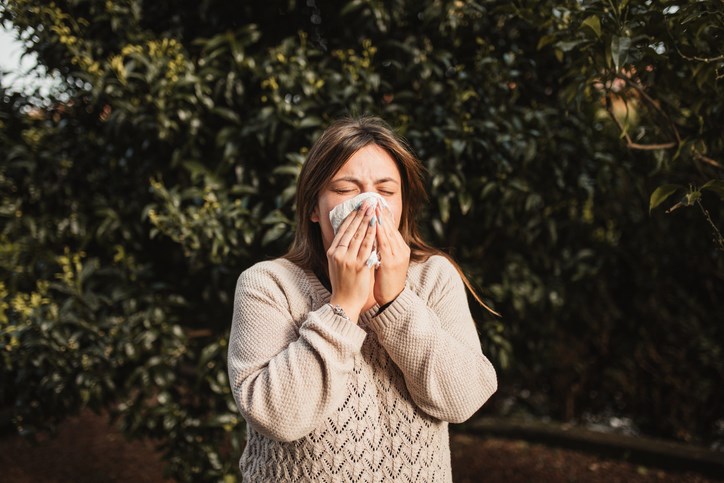Fall allergy season starts mid August and runs until the first good frost in September or even until mid October. So, what can you do when you have a sore throat, itchy swollen eyes and a runny nose?
Knowing why is the first step to making yourself more comfortable. Ragweed is the most common cause of fall seasonal allergies. Did you know, one plant can release up to a million grains of pollen per day and up to one billion in a season? The grains get carried off by the wind and can travel up to 250 km away. That is a lot of pollen and a great distance for just a single plant. Imagine how much pollen is produced in a season if you had 10 plants or even a hundred?
Unfortunately, according to Stats Canada, up to 40% of Canadians suffer from fall allergies. Ragweed pollen is one of the highest causes of allergic reactions. It can trigger anywhere from mild to severe symptoms including irritated, puffy and or itchy eyes, a runny nose, sneezing and sore throat. These symptoms are medically known as rhinitis and conjunctivitis.
According to Dr. Kelly Anderson, chief medical officer at Felix, “Allergic rhinitis is most simply explained as a runny nose secondary to seasonal allergies. It’s sometimes called 'hay fever.' Allergic rhinitis refers to inflammation in the nose (rhinitis) that occurs when you are exposed to a substance you are allergic to.”
She continues to say, “Allergic conjunctivitis is an eye inflammation caused by an allergic reaction to substances like pollen. The inside of your eyelids and the covering of your eyeball have a membrane called the conjunctiva. The conjunctiva is susceptible to irritation from allergens, especially during hay fever season.”
Ragweed is a late morning pollinator, so going out early in the mornings for a walk or run will help to minimize triggering your symptoms. Rain helps to make the pollen drop to the ground, so go out after a good rain. Keep your windows closed and use an air conditioner with a built-in HEPA filter. After being outdoors, shower and change your clothing.
How do you treat rhinitis and conjunctivitis? Rhinitis is swelling in the nasal passage creating a stuffy nose or a runny nose. Conjunctivitis is the swelling and irritation in the eyes. According to the Felix website, an oral antihistamine, a corticosteroid nasal spray, and eye drops will make allergy season a lot more pleasant.
Get an assessment by a doctor or nurse practitioner to determine the best treatment avenue. Over-the-counter medications work but in those extreme cases you may find you need something stronger. Time to talk to your doctor about your options.
Telehealth companies like Felix put you in touch with doctors who can diagnose your allergies, send the medications right to your home and set up a refill schedule. For seasonal allergy sufferers it saves you a trip to the waiting room when you are avoiding the outdoors.
For more information check their website at https://www.felixforyou.ca/ and get back to being you once again.




